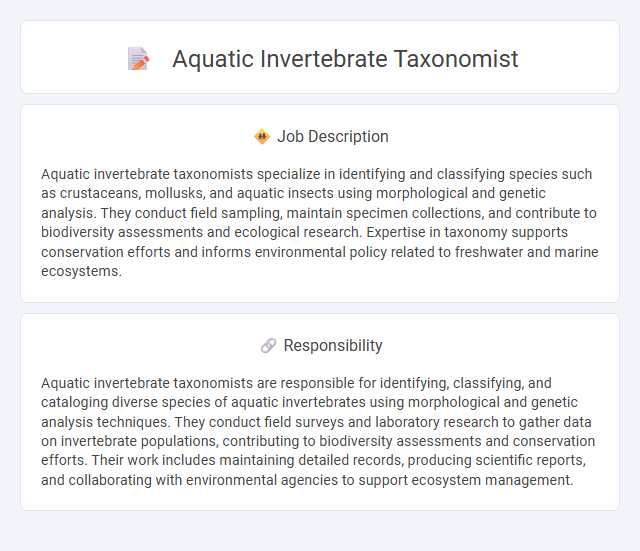
Aquatic invertebrate taxonomists specialize in identifying and classifying species such as crustaceans, mollusks, and aquatic insects using morphological and genetic analysis. They conduct field sampling, maintain specimen collections, and contribute to biodiversity assessments and ecological research. Expertise in taxonomy supports conservation efforts and informs environmental policy related to freshwater and marine ecosystems.
Individuals with a strong attention to detail and a passion for aquatic ecosystems are likely suitable for a career as an aquatic invertebrate taxonomist. Those who enjoy fieldwork, lab analysis, and meticulous identification of species may find this job fulfilling. People who prefer routine tasks or minimal outdoor activity might find this role less compatible with their preferences.
Qualification
An aquatic invertebrate taxonomist typically requires a bachelor's degree in biology, marine science, or environmental science, with many roles preferring a master's or Ph.D. in taxonomy, zoology, or ecology. Extensive knowledge of aquatic ecosystems, invertebrate morphology, and molecular identification techniques is essential. Proficiency in data analysis software, field sampling methods, and scientific research publication enhances job qualification.
Responsibility
Aquatic invertebrate taxonomists are responsible for identifying, classifying, and cataloging diverse species of aquatic invertebrates using morphological and genetic analysis techniques. They conduct field surveys and laboratory research to gather data on invertebrate populations, contributing to biodiversity assessments and conservation efforts. Their work includes maintaining detailed records, producing scientific reports, and collaborating with environmental agencies to support ecosystem management.
Benefit
An aquatic invertebrate taxonomist is likely to benefit from a career that offers opportunities to contribute significantly to biodiversity conservation and ecosystem management. They may experience intellectual satisfaction through detailed species identification and classification, which can support environmental research and policy-making. This role often provides access to fieldwork and advanced research facilities, enhancing practical skills and professional development.
Challenge
Working as an aquatic invertebrate taxonomist likely involves challenges related to accurately identifying and classifying diverse species within complex ecosystems. The variability in morphological traits and limited genetic data may pose difficulties in distinguishing closely related species. Fieldwork conditions and the need for meticulous laboratory analysis could further complicate the research and documentation process.
Career Advancement
Aquatic invertebrate taxonomists experience career advancement through specialization in niche taxa, developing expertise in molecular identification techniques, and contributing to biodiversity assessments and conservation projects. Progression opportunities include senior research positions, project leadership roles, and collaboration with environmental agencies or academic institutions. Enhancing skills in data analysis, ecological modeling, and publishing peer-reviewed research further supports upward mobility within scientific and environmental organizations.
 kuljobs.com
kuljobs.com